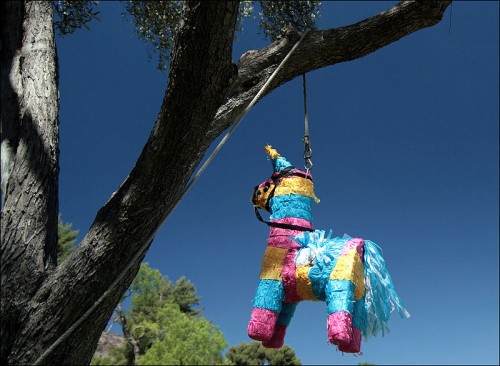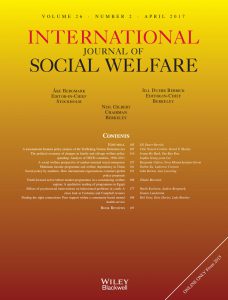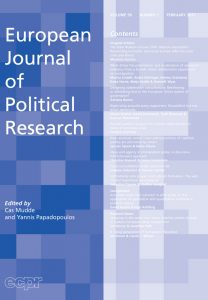Good Politics v. Collective Responsibility in Times of Financial Crisis
 Since the collapse of the global financial system in 2008, the most popular course of action- above job searches and credit defaults, I’d venture- has been finger pointing. In his first State of the Union address last week, President Obama continue the trend by hammering against the banking system. In the January 30th edition of the economist, one author points to an entertaining illustration made on the CNBC show, ‘Mad Money,’ which showed a “Lloyd Blankfein pinata” that when split, gold coins poured out of. The Economist reports that the assault intensified when the President announced his plan to cap the size of these financial institutions as well as “ban their ‘proprietary’ trading… and limit their involvement in hedge funds and private equity.” The aim of such measures is to join with other bills in the works to allow regulators to limit the scope of institutions that threaten financial stability. Coming on the heels of the Democratic defeat in Massachusetts, the move can certainly not be separated from politics but it is likely to have been in the works for far longer than a few days.
Since the collapse of the global financial system in 2008, the most popular course of action- above job searches and credit defaults, I’d venture- has been finger pointing. In his first State of the Union address last week, President Obama continue the trend by hammering against the banking system. In the January 30th edition of the economist, one author points to an entertaining illustration made on the CNBC show, ‘Mad Money,’ which showed a “Lloyd Blankfein pinata” that when split, gold coins poured out of. The Economist reports that the assault intensified when the President announced his plan to cap the size of these financial institutions as well as “ban their ‘proprietary’ trading… and limit their involvement in hedge funds and private equity.” The aim of such measures is to join with other bills in the works to allow regulators to limit the scope of institutions that threaten financial stability. Coming on the heels of the Democratic defeat in Massachusetts, the move can certainly not be separated from politics but it is likely to have been in the works for far longer than a few days.
However, simply outlining such a plan does not make it so. Any such scheme will inevitably change shape several times through the legislative process before it makes its way back to President Obama. Various political concerns from both sides of the aisle, to say nothing of its actual effect on the banking system will all serve as little grains of sand in its polishing. The Economist also pointed out that the President spent far more time in his speech attacking big banks than actually outlining his plan for reform. Ultimately, however,bank bashing is good politics when it comes to courting the increasingly populist (and highly coveted) independent vote in the United States. If Massachusetts is to teach politicians anything it is just how vital this dance is to retaining or gaining power.
Despite the appeal of the blame game, it isn’t a terribly useful way to view things nor will it move us forward as a society in very a productive manner. While ‘power elites’ such as bankers, regulators, and politicians are often seen as steering the ship, Leonard Seabrooke and Eleni Tsingour remind us that we are all important social actors, who also influence the tides. The authors note in their article, Power Elites and Everyday Politics in International Financial Reform, that, “The Politicians have an interest in being re-elected. The banks have an interest in short-term profits to please shareholders and boards. Ideally, the regulators have an interest in the long-term stability of the financial system. And citizens have an interest in the long term stability of the system, having heavily invested in it through pensions and, depending on the country, housing.” The authors suggest that rather than seeing ourselves as separate bodies being acted upon it is, perhaps, more useful to view ourselves as “linked ecologies” through the work of Andrew Abbott.
In terms of solving policy problems-which are the root cause of the financial crisis- Abbott’s concern is “how coalitions are formed within a professional ecology and how strategic coalitions form alliances between professions to capture a ‘policy location.'” The authors explain that through this framework we are able to view policy as constructed through a network of actors who do not have total control over how their assets and ideas are used to reach the final outcome. In this way groups of power elites experience ‘permeable boundaries’ in their clubs. Final outcomes are influenced not only by the opposing views of those with equal power but also the general public.
This is certainly not to say that the average citizen wields quantifiably equal power to a senior statesman or the president of a large bank but it does mean that they are not powerless either. Many from the general public tolerated- if not accepted- greed, excess, and dangerous regulatory policies during boom times and we are therefore not completely excused from blame during the bust. Seabrooke and Tsingou remind us that we share an important link in the process and the rise of populist political movements both in 2008 as well as 2009 remind us of the change a group of concerned citizens can affect.
![]() Read ‘Garrottes and Sticks’ in The Economist online.
Read ‘Garrottes and Sticks’ in The Economist online.
![]() Read ‘Power Elites and Everyday Politics in International Financial Reform’ in International Political Sociology online.
Read ‘Power Elites and Everyday Politics in International Financial Reform’ in International Political Sociology online.





Empowering actors–other than elites–is a fabulous strategy for bringing change outside of the legislative process. In this case participants in the economy are the grains of sand that produce change on the environment, rather than the elites. This is a very interesting argument, and a great application to the ongoing economic crisis in America.
Keri